{any emphasis is added by me, Heather}
CHAPTER 4. The Counterpane.
Upon waking next morning about daylight, I found Queequeg’s arm thrown over me in the most loving and affectionate manner. You had almost thought I had been his wife. The counterpane1 was of patchwork, full of odd little parti-coloured squares and triangles; and this arm of his tattooed all over with an interminable Cretan labyrinth2 of a figure, no two parts of which were of one precise shade—owing I suppose to his keeping his arm at sea unmethodically in sun and shade, his shirt sleeves irregularly rolled up at various times—this same arm of his, I say,3 looked for all the world like a strip of that same patchwork quilt. Indeed, partly lying on it as the arm did when I first awoke, I could hardly tell it from the quilt, they so blended their hues together; and it was only by the sense of weight and pressure that I could tell that Queequeg was hugging me.
My sensations were strange. Let me try to explain them. When I was a child, I well remember a somewhat similar circumstance that befell me; whether it was a reality or a dream, I never could entirely settle. The circumstance was this. I had been cutting up some caper or other—I think it was trying to crawl up the chimney, as I had seen a little sweep do a few days previous; and my stepmother who, somehow or other,4 was all the time whipping me, or sending me to bed supperless,—my mother dragged me by the legs out of the chimney and packed me off to bed, though it was only two o’clock in the afternoon of the 21st June, the longest day in the year in our hemisphere5. I felt dreadfully. But there was no help for it, so up stairs I went to my little room in the third floor, undressed myself as slowly as possible so as to kill time, and with a bitter sigh got between the sheets.
I lay there dismally calculating that sixteen entire hours must elapse before I could hope for a resurrection. Sixteen hours in bed! the small of my back ached to think of it. And it was so light too; the sun shining in at the window, and a great rattling of coaches in the streets, and the sound of gay voices all over the house. I felt worse and worse—at last I got up, dressed, and softly going down in my stockinged feet, sought out my stepmother, and suddenly threw myself at her feet, beseeching her as a particular favour to give me a good slippering6 for my misbehaviour; anything indeed but condemning me to lie abed such an unendurable length of time. But she was the best and most conscientious of stepmothers, and back I had to go to my room. For several hours I lay there broad awake, feeling a great deal worse than I have ever done since, even from the greatest subsequent misfortunes. At last I must have fallen into a troubled nightmare of a doze; and slowly waking from it—half steeped in dreams—I opened my eyes, and the before sun-lit room was now wrapped in outer darkness. Instantly I felt a shock running through all my frame; nothing was to be seen, and nothing was to be heard; but a supernatural hand seemed placed in mine. My arm hung over the counterpane, and the nameless, unimaginable, silent form or phantom, to which the hand belonged, seemed closely seated by my bed-side. For what seemed ages piled on ages, I lay there, frozen with the most awful fears, not daring to drag away my hand; yet ever thinking that if I could but stir it one single inch, the horrid spell would be broken.7 I knew not how this consciousness at last glided away from me; but waking in the morning, I shudderingly remembered it all, and for days and weeks and months afterwards I lost myself in confounding attempts to explain the mystery. Nay, to this very hour, I often puzzle myself with it.
Now, take away the awful fear, and my sensations at feeling the supernatural hand in mine were very similar, in their strangeness, to those which I experienced on waking up and seeing Queequeg’s pagan8 arm thrown round me. But at length all the past night’s events soberly recurred, one by one, in fixed reality, and then I lay only alive to the comical predicament.9 For though I tried to move his arm—unlock his bridegroom clasp—yet, sleeping as he was, he still hugged me tightly, as though naught but death should part us twain. I now strove to rouse him—“Queequeg!”—but his only answer was a snore. I then rolled over, my neck feeling as if it were in a horse-collar;10 and suddenly felt a slight scratch. Throwing aside the counterpane, there lay the tomahawk sleeping by the savage’s side, as if it were a hatchet-faced baby. A pretty pickle, truly, thought I; abed here in a strange house in the broad day, with a cannibal and a tomahawk! “Queequeg!—in the name of goodness, Queequeg, wake!” At length, by dint of much wriggling, and loud and incessant expostulations upon the unbecomingness of his hugging a fellow male in that matrimonial sort of style, I succeeded in extracting a grunt; and presently, he drew back his arm, shook himself all over like a Newfoundland dog11 just from the water, and sat up in bed, stiff as a pike-staff, looking at me, and rubbing his eyes as if he did not altogether remember how I came to be there, though a dim consciousness of knowing something about me seemed slowly dawning over him. Meanwhile, I lay quietly eyeing him, having no serious misgivings now, and bent upon narrowly observing so curious a creature. When, at last, his mind seemed made up touching the character of his bedfellow, and he became, as it were, reconciled to the fact; he jumped out upon the floor, and by certain signs and sounds gave me to understand that, if it pleased me, he would dress first and then leave me to dress afterwards, leaving the whole apartment to myself. Thinks I, Queequeg, under the circumstances, this is a very civilized overture; but, the truth is, these savages have an innate sense of delicacy, say what you will; it is marvellous how essentially polite they are. I pay this particular compliment to Queequeg, because he treated me with so much civility and consideration, while I was guilty of great rudeness; staring at him from the bed, and watching all his toilette motions; for the time my curiosity getting the better of my breeding.12 Nevertheless, a man like Queequeg you don’t see every day, he and his ways were well worth unusual regarding.
He commenced dressing at top by donning his beaver hat, a very tall one, by the by, and then—still minus his trowsers—he hunted up his boots. What under the heavens he did it for, I cannot tell, but his next movement was to crush himself—boots in hand, and hat on—under the bed; when, from sundry violent gaspings and strainings, I inferred he was hard at work booting himself; though by no law of propriety that I ever heard of, is any man required to be private when putting on his boots. But Queequeg, do you see, was a creature in the transition stage—neither caterpillar nor butterfly. He was just enough civilized to show off his outlandishness in the strangest possible manners. His education was not yet completed. He was an undergraduate.13 If he had not been a small degree civilized, he very probably would not have troubled himself with boots at all; but then, if he had not been still a savage, he never would have dreamt of getting under the bed to put them on. At last, he emerged with his hat very much dented and crushed down over his eyes, and began creaking and limping about the room, as if, not being much accustomed to boots, his pair of damp, wrinkled cowhide ones—probably not made to order either—rather pinched and tormented him at the first go off of a bitter cold morning.
Seeing, now, that there were no curtains to the window, and that the street being very narrow, the house opposite commanded a plain view into the room, and observing more and more the indecorous figure that Queequeg made, staving14 about with little else but his hat and boots on; I begged him as well as I could, to accelerate his toilet somewhat, and particularly to get into his pantaloons as soon as possible. He complied, and then proceeded to wash himself. At that time in the morning any Christian would have washed his face; but Queequeg, to my amazement, contented himself with restricting his ablutions to his chest, arms, and hands. He then donned his waistcoat, and taking up a piece of hard soap on the wash-stand centre table, dipped it into water and commenced lathering his face. I was watching to see where he kept his razor, when lo and behold, he takes the harpoon from the bed corner, slips out the long wooden stock, unsheathes the head, whets it a little on his boot, and striding up to the bit of mirror against the wall, begins a vigorous scraping, or rather harpooning of his cheeks.15 Thinks I, Queequeg, this is using Rogers’s16 best cutlery with a vengeance. Afterwards I wondered the less at this operation when I came to know of what fine steel the head of a harpoon is made, and how exceedingly sharp the long straight edges are always kept.
The rest of his toilet was soon achieved, and he proudly marched out of the room, wrapped up in his great pilot monkey jacket, and sporting his harpoon like a marshal’s baton.
CHAPTER 5. Breakfast.
I quickly followed suit, and descending into the bar-room accosted the grinning landlord very pleasantly. I cherished no malice towards him, though he had been skylarking17 with me not a little in the matter of my bedfellow.
However, a good laugh is a mighty good thing, and rather too scarce a good thing; the more’s the pity. So, if any one man, in his own proper person, afford stuff for a good joke to anybody, let him not be backward, but let him cheerfully allow himself to spend and be spent in that way. And the man that has anything bountifully laughable about him, be sure there is more in that man than you perhaps think for.18
The bar-room was now full of the boarders who had been dropping in the night previous, and whom I had not as yet had a good look at. They were nearly all whalemen; chief mates, and second mates, and third mates, and sea carpenters, and sea coopers, and sea blacksmiths, and harpooneers, and ship keepers; a brown and brawny company, with bosky19 beards; an unshorn, shaggy set, all wearing monkey jackets for morning gowns.
You could pretty plainly tell how long each one had been ashore. This young fellow’s healthy cheek is like a sun-toasted pear in hue, and would seem to smell almost as musky; he cannot have been three days landed from his Indian voyage. That man next him looks a few shades lighter; you might say a touch of satin wood20 is in him. In the complexion of a third still lingers a tropic tawn, but slightly bleached withal; he doubtless has tarried whole weeks ashore. But who could show a cheek like Queequeg? which, barred with various tints, seemed like the Andes’ western slope,21 to show forth in one array, contrasting climates, zone by zone.
“Grub, ho!” now cried the landlord, flinging open a door, and in we went to breakfast.
They say that men who have seen the world, thereby become quite at ease in manner, quite self-possessed in company. Not always, though: Ledyard, the great New England traveller, and Mungo Park,22 the Scotch one; of all men, they possessed the least assurance in the parlor. But perhaps the mere crossing of Siberia in a sledge drawn by dogs as Ledyard did, or the taking a long solitary walk on an empty stomach, in the negro heart of Africa, which was the sum of poor Mungo’s performances—this kind of travel, I say, may not be the very best mode of attaining a high social polish. Still, for the most part, that sort of thing is to be had anywhere.
These reflections just here are occasioned by the circumstance that after we were all seated at the table, and I was preparing to hear some good stories about whaling; to my no small surprise, nearly every man maintained a profound silence. And not only that, but they looked embarrassed. Yes, here were a set of sea-dogs, many of whom without the slightest bashfulness had boarded great whales on the high seas—entire strangers to them—and duelled them dead without winking; and yet, here they sat at a social breakfast table—all of the same calling, all of kindred tastes—looking round as sheepishly at each other as though they had never been out of sight of some sheepfold among the Green Mountains.23 A curious sight; these bashful bears, these timid warrior whalemen!
But as for Queequeg—why, Queequeg sat there among them—at the head of the table, too, it so chanced; as cool as an icicle. To be sure I cannot say much for his breeding. His greatest admirer could not have cordially justified his bringing his harpoon into breakfast with him, and using it there without ceremony; reaching over the table with it, to the imminent jeopardy of many heads, and grappling24 the beefsteaks towards him. But that was certainly very coolly done by him, and every one knows that in most people’s estimation, to do anything coolly is to do it genteelly.
We will not speak of all Queequeg’s peculiarities here; how he eschewed coffee and hot rolls, and applied his undivided attention to beefsteaks, done rare. Enough, that when breakfast was over he withdrew like the rest into the public room, lighted his tomahawk-pipe, and was sitting there quietly digesting and smoking with his inseparable hat on, when I sallied out for a stroll.
CHAPTER 6. The Street.
If I had been astonished at first catching a glimpse of so outlandish an individual as Queequeg circulating among the polite society of a civilized town, that astonishment soon departed upon taking my first daylight stroll through the streets of New Bedford.
In thoroughfares nigh the docks, any considerable seaport will frequently offer to view the queerest looking nondescripts from foreign parts. Even in Broadway and Chestnut streets, Mediterranean mariners will sometimes jostle the affrighted ladies. Regent Street is not unknown to Lascars and Malays; and at Bombay, in the Apollo Green,25 live Yankees have often scared the natives. But New Bedford beats all Water Street and Wapping.26 In these last-mentioned haunts you see only sailors; but in New Bedford, actual cannibals stand chatting at street corners; savages outright; many of whom yet carry on their bones unholy flesh. It makes a stranger stare.
But, besides the Feegeeans, Tongatobooarrs, Erromanggoans, Pannangians, and Brighggians, and, besides the wild specimens of the whaling-craft which unheeded reel about the streets, you will see other sights still more curious, certainly more comical. There weekly arrive in this town scores of green Vermonters and New Hampshire men, all athirst for gain and glory in the fishery. They are mostly young, of stalwart frames; fellows who have felled forests, and now seek to drop the axe and snatch the whale-lance. Many are as green as the Green Mountains whence they came. In some things you would think them but a few hours old. Look there! that chap strutting round the corner. He wears a beaver hat and swallow-tailed coat,27 girdled with a sailor-belt and sheath-knife. Here comes another with a sou’-wester and a bombazine cloak.
No town-bred dandy will compare with a country-bred one—I mean a downright bumpkin28 dandy—a fellow that, in the dog-days, will mow his two acres in buckskin gloves29 for fear of tanning his hands. Now when a country dandy like this takes it into his head to make a distinguished reputation, and joins the great whale-fishery, you should see the comical things he does upon reaching the seaport. In bespeaking his sea-outfit, he orders bell-buttons to his waistcoats; straps to his canvas trowsers.30 Ah, poor Hay-Seed! how bitterly will burst those straps in the first howling gale, when thou art driven, straps, buttons, and all, down the throat of the tempest.
But think not that this famous town has only harpooneers, cannibals, and bumpkins to show her visitors. Not at all. Still New Bedford is a queer place. Had it not been for us whalemen, that tract of land would this day perhaps have been in as howling condition as the coast of Labrador. As it is, parts of her back country are enough to frighten one, they look so bony. The town itself is perhaps the dearest place to live in, in all New England. It is a land of oil, true enough: but not like Canaan; a land, also, of corn and wine. The streets do not run with milk; nor in the spring-time do they pave them with fresh eggs. Yet, in spite of this, nowhere in all America will you find more patrician-like houses; parks and gardens more opulent, than in New Bedford.31 Whence came they? how planted upon this once scraggy scoria of a country?
Go and gaze upon the iron emblematical harpoons round yonder lofty mansion, and your question will be answered. Yes; all these brave houses and flowery gardens came from the Atlantic, Pacific, and Indian oceans. One and all, they were harpooned and dragged up hither from the bottom of the sea. Can Herr Alexander32 perform a feat like that?
In New Bedford, fathers, they say, give whales for dowers to their daughters, and portion off their nieces with a few porpoises a-piece. You must go to New Bedford to see a brilliant wedding; for, they say, they have reservoirs of oil in every house, and every night recklessly burn their lengths in spermaceti candles.
In summer time, the town is sweet to see; full of fine maples—long avenues of green and gold. And in August, high in air, the beautiful and bountiful horse-chestnuts, candelabra-wise, proffer the passer-by their tapering upright cones of congregated blossoms. So omnipotent is art; which in many a district of New Bedford has superinduced bright terraces of flowers upon the barren refuse rocks thrown aside at creation’s final day.
And the women of New Bedford, they bloom like their own red roses. But roses only bloom in summer; whereas the fine carnation of their cheeks is perennial as sunlight in the seventh heavens. Elsewhere match that bloom of theirs, ye cannot, save in Salem, where they tell me the young girls breathe such musk, their sailor sweethearts smell them miles off shore, as though they were drawing nigh the odorous Moluccas33 instead of the Puritanic sands.
CHAPTER 7. The Chapel.
In this same New Bedford there stands a Whaleman’s Chapel, and few are the moody fishermen, shortly bound for the Indian Ocean or Pacific, who fail to make a Sunday visit to the spot. I am sure that I did not.
Returning from my first morning stroll, I again sallied out upon this special errand. The sky had changed from clear, sunny cold, to driving sleet and mist. Wrapping myself in my shaggy jacket of the cloth called bearskin,34 I fought my way against the stubborn storm. Entering, I found a small scattered congregation of sailors, and sailors’ wives and widows. A muffled silence reigned, only broken at times by the shrieks of the storm. Each silent worshipper seemed purposely sitting apart from the other, as if each silent grief were insular and incommunicable. The chaplain had not yet arrived; and there these silent islands of men and women sat steadfastly eyeing several marble tablets, with black borders, masoned into the wall on either side the pulpit. Three of them ran something like the following, but I do not pretend to quote:—
SACRED TO THE MEMORY OF JOHN TALBOT, Who, at the age of eighteen, was lost overboard, Near the Isle of Desolation,35 off Patagonia, November 1_st_, 1836. THIS TABLET Is erected to his Memory BY HIS SISTER.
SACRED TO THE MEMORY OF ROBERT LONG, WILLIS ELLERY, NATHAN COLEMAN, WALTER CANNY, SETH MACY, AND SAMUEL GLEIG, Forming one of the boats’ crews OF THE SHIP ELIZA Who were towed out of sight by a Whale, On the Off-shore Ground36 in the PACIFIC, December 31_st_, 1839. THIS MARBLE Is here placed by their surviving SHIPMATES.
SACRED TO THE MEMORY OF The late CAPTAIN EZEKIEL HARDY,37 Who in the bows of his boat was killed by a Sperm Whale on the coast of Japan, August 3_d_, 1833. THIS TABLET Is erected to his Memory BY HIS WIDOW.38
Shaking off the sleet from my ice-glazed hat and jacket, I seated myself near the door, and turning sideways was surprised to see Queequeg near me. Affected by the solemnity of the scene, there was a wondering gaze of incredulous curiosity in his countenance. This savage was the only person present who seemed to notice my entrance; because he was the only one who could not read, and, therefore, was not reading those frigid inscriptions on the wall. Whether any of the relatives of the seamen whose names appeared there were now among the congregation, I knew not; but so many are the unrecorded accidents in the fishery, and so plainly did several women present wear the countenance if not the trappings of some unceasing grief, that I feel sure that here before me were assembled those, in whose unhealing hearts the sight of those bleak tablets sympathetically caused the old wounds to bleed afresh.
Oh! ye whose dead lie buried beneath the green grass; who standing among flowers can say—here, here lies my beloved; ye know not the desolation that broods in bosoms like these.39 What bitter blanks in those black-bordered marbles which cover no ashes! What despair in those immovable inscriptions! What deadly voids40 and unbidden infidelities in the lines41 that seem to gnaw upon all Faith, and refuse resurrections to the beings who have placelessly perished without a grave. As well might those tablets stand in the cave of Elephanta 42as here.
In what census of living creatures, the dead of mankind are included; why it is that a universal proverb says of them, that they tell no tales, though containing more secrets than the Goodwin Sands;43 how it is that to his name who yesterday departed for the other world, we prefix44 so significant and infidel a word, and yet do not thus entitle45 him, if he but embarks for the remotest Indies of this living earth; why the Life Insurance Companies pay death-forfeitures upon immortals;46 in what eternal, unstirring paralysis, and deadly, hopeless trance, yet lies antique Adam who died sixty round centuries ago; how it is that we still refuse to be comforted for those who we nevertheless maintain are dwelling in unspeakable bliss; why all the living so strive to hush all the dead; wherefore but the rumor of a knocking in a tomb will terrify a whole city. All these things are not without their meanings.47
But Faith, like a jackal, feeds among the tombs, and even from these dead doubts she gathers her most vital hope.
It needs scarcely to be told, with what feelings, on the eve of a Nantucket voyage, I regarded those marble tablets, and by the murky light of that darkened, doleful day read the fate of the whalemen who had gone before me. Yes, Ishmael, the same fate may be thine. But somehow I grew merry again. Delightful inducements to embark, fine chance for promotion, it seems—aye, a stove boat48 will make me an immortal by brevet.49 Yes, there is death in this business of whaling—a speechlessly quick chaotic bundling of a man into Eternity. But what then? Methinks we have hugely mistaken this matter of Life and Death. Methinks that what they call my shadow here on earth is my true substance. Methinks that in looking at things spiritual, we are too much like oysters observing the sun through the water, and thinking that thick water the thinnest of air. Methinks my body is but the lees50 of my better being. In fact take my body who will, take it I say, it is not me. And therefore three cheers for Nantucket; and come a stove boat and stove body when they will, for stave my soul, Jove himself cannot.51
CHAPTER 8. The Pulpit.
I had not been seated very long ere a man of a certain venerable robustness entered; immediately as the storm-pelted door flew back upon admitting him, a quick regardful eyeing of him by all the congregation, sufficiently attested that this fine old man was the chaplain. Yes, it was the famous Father Mapple,52 so called by the whalemen, among whom he was a very great favourite. He had been a sailor and a harpooneer53 in his youth, but for many years past had dedicated his life to the ministry. At the time I now write of, Father Mapple was in the hardy winter of a healthy old age; that sort of old age which seems merging into a second flowering youth, for among all the fissures of his wrinkles, there shone certain mild gleams of a newly developing bloom—the spring verdure peeping forth even beneath February’s snow. No one having previously heard his history, could for the first time behold Father Mapple without the utmost interest, because there were certain engrafted clerical peculiarities about him, imputable to that adventurous maritime life he had led. When he entered I observed that he carried no umbrella, and certainly had not come in his carriage, for his tarpaulin hat54 ran down with melting sleet, and his great pilot cloth jacket55 seemed almost to drag him to the floor with the weight of the water it had absorbed. However, hat and coat and overshoes were one by one removed, and hung up in a little space in an adjacent corner; when, arrayed in a decent suit, he quietly approached the pulpit.
Like most old fashioned pulpits, it was a very lofty one, and since a regular stairs to such a height would, by its long angle with the floor, seriously contract the already small area of the chapel, the architect, it seemed, had acted upon the hint of Father Mapple, and finished the pulpit without a stairs, substituting a perpendicular side ladder, like those used in mounting a ship from a boat at sea. The wife of a whaling captain had provided the chapel with a handsome pair of red worsted man-ropes56 for this ladder, which, being itself nicely headed, and stained with a mahogany colour, the whole contrivance, considering what manner of chapel it was, seemed by no means in bad taste. Halting for an instant at the foot of the ladder, and with both hands grasping the ornamental knobs of the man-ropes, Father Mapple cast a look upwards, and then with a truly sailor-like but still reverential dexterity, hand over hand, mounted the steps as if ascending the main-top57 of his vessel.
The perpendicular parts of this side ladder, as is usually the case with swinging ones, were of cloth-covered rope, only the rounds58 were of wood, so that at every step there was a joint. At my first glimpse of the pulpit, it had not escaped me that however convenient for a ship, these joints in the present instance seemed unnecessary. For I was not prepared to see Father Mapple after gaining the height, slowly turn round, and stooping over the pulpit, deliberately drag up the ladder step by step, till the whole was deposited within, leaving him impregnable in his little Quebec.59
I pondered some time without fully comprehending the reason for this. Father Mapple enjoyed such a wide reputation for sincerity and sanctity, that I could not suspect him of courting notoriety by any mere tricks of the stage. No, thought I, there must be some sober reason for this thing; furthermore, it must symbolize something unseen. Can it be, then, that by that act of physical isolation, he signifies his spiritual withdrawal for the time, from all outward worldly ties and connexions? Yes, for replenished with the meat and wine of the word, to the faithful man of God, this pulpit, I see, is a self-containing stronghold—a lofty Ehrenbreitstein,60 with a perennial well of water within the walls.
But the side ladder was not the only strange feature of the place, borrowed from the chaplain’s former sea-farings. Between the marble cenotaphs61 on either hand of the pulpit, the wall which formed its back was adorned with a large painting representing a gallant ship beating against a terrible storm off a lee coast62 of black rocks and snowy breakers. But high above the flying scud63 and dark-rolling clouds, there floated a little isle of sunlight, from which beamed forth an angel’s face; and this bright face shed a distinct spot of radiance upon the ship’s tossed deck, something like that silver plate now inserted into the Victory’s plank where Nelson fell.64 “Ah, noble ship,” the angel seemed to say, “beat on, beat on, thou noble ship, and bear a hardy helm; for lo! the sun is breaking through; the clouds are rolling off—serenest azure is at hand.”
Nor was the pulpit itself without a trace of the same sea-taste that had achieved the ladder and the picture. Its panelled front was in the likeness of a ship’s bluff bows, and the Holy Bible rested on a projecting piece of scroll work, fashioned after a ship’s fiddle-headed65 beak.
What could be more full of meaning?—for the pulpit is ever this earth’s foremost part; all the rest comes in its rear; the pulpit leads the world. From thence it is the storm of God’s quick wrath is first descried,66 and the bow must bear the earliest brunt. From thence it is the God of breezes fair or foul is first invoked for favourable winds. Yes, the world’s a ship on its passage out, and not a voyage complete; and the pulpit is its prow.
Homework: read up on Jonah (perhaps even the Reform Judiasm take on this Hebrew Prophet).
==Have notes to add? Email me heather@craftlit.com or call 1-206-350-1642 or use speakpipe.com/craftlit.==
Footnotes
Footnotes
-
a bedspread; From Old French contrepointe based on Medieval Latin Culcita Puncta ( “stitched cushioning”) the change in the ending was due to an association with Pane an archaic word for Cloth. (From the OED) I don’t know if it changed meaning in the 19th century or if it was just Iowa, but my great-grandma’s counterpane was quite thin. More like a dust-cover over the blanket or heavy quilt. ↩
-
If Queequeg has Maori-style tatoos, this would be one heck of a labyrinth! ↩
-
I don’t know if you’d call this a motif or a colloquialism, but you’ll see it over and over in Ishmael’s narrative to us. Let me know if you know what it’s called! ↩
-
ahem. ↩
-
I can’t remember having seen this distinction in any book from this period. Heck, I don’t think I’ve seen it often in modern fiction! ↩
-
I’ve never heard this term used for a whipping, but this whole paragraph feels like Twain to me. ↩
-
a pretty accurate description of night terrors. ↩
-
We will keep seeing terms like Pagan and Savage used when referring to the harpooners in general. Again, this is Melville writing for his audience, not because he’s casting aspersions. ↩
-
There’s a sizable amount of scholarship using the end of the previous chapter and this chapter to point out that Ishmael and Queequeg are in a more intimate relationship than a casual reading might imply. Melville’s history with Hawthorne appears to support this as more than plausible. ↩
-
big and heavy bugger, those horse-collars:
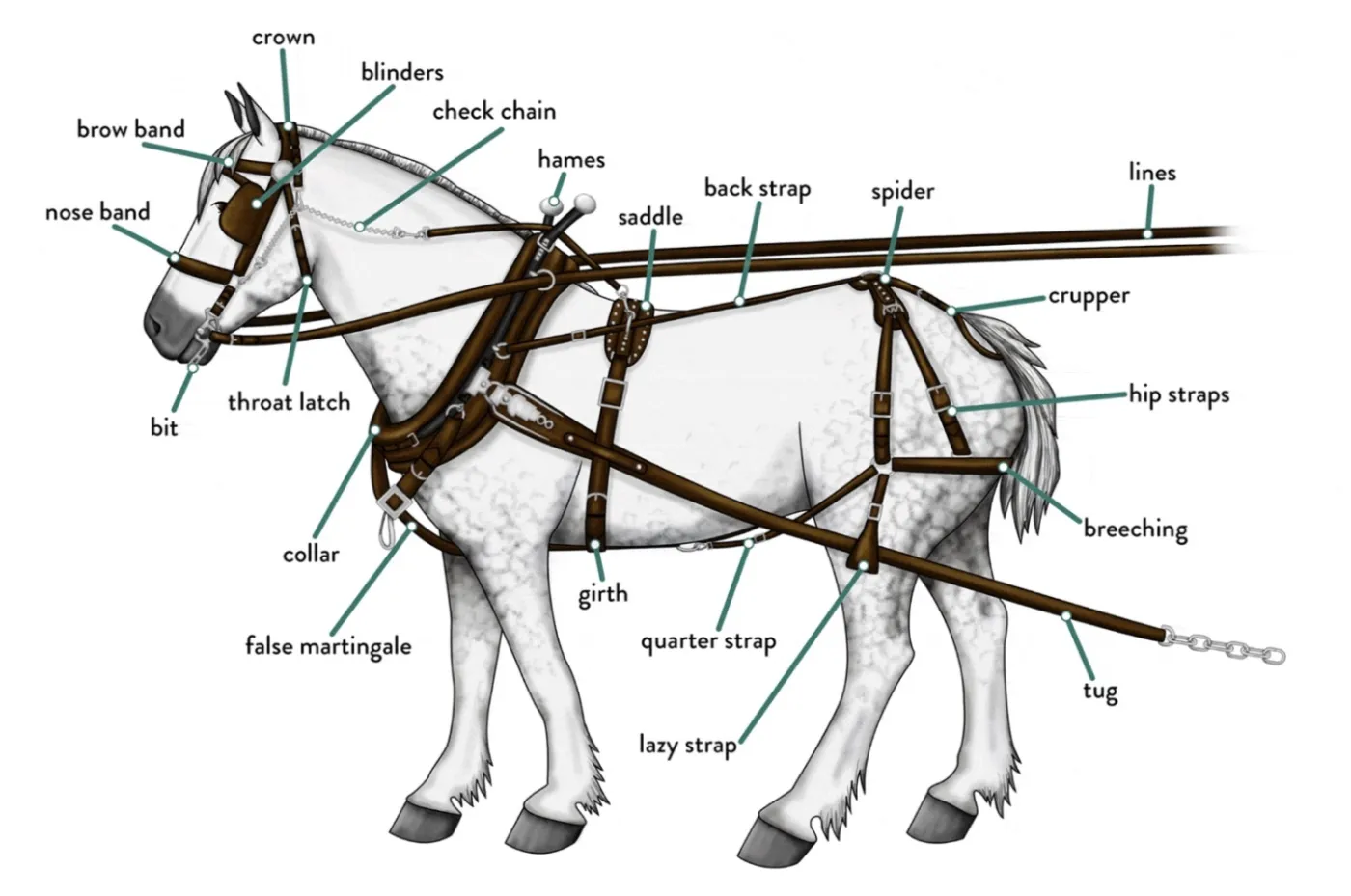 ↩
↩ -
also big:
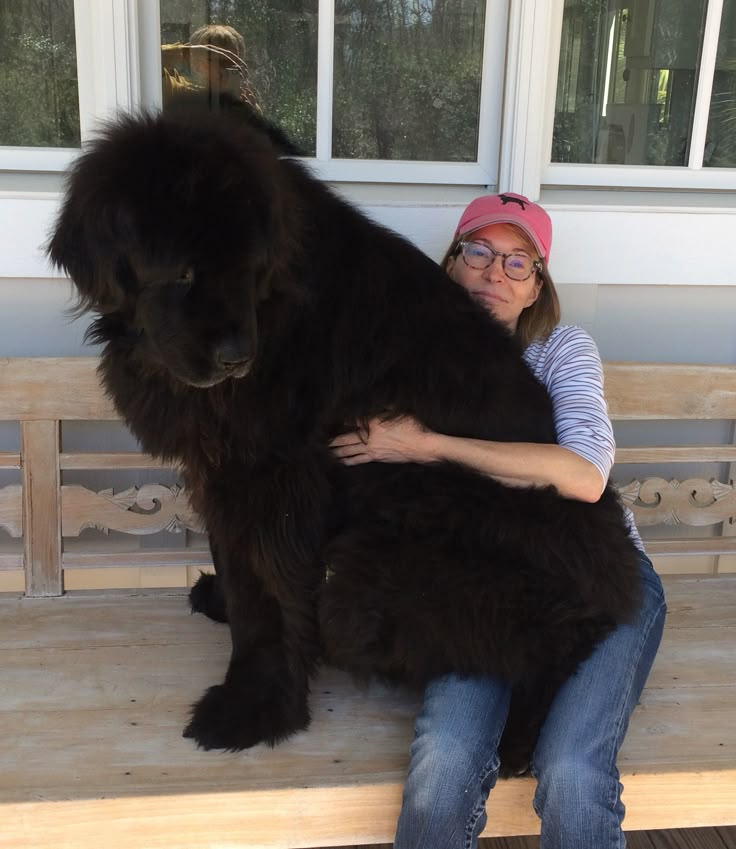 ↩
↩ -
whispers of Huck Finn? ↩
-
Melville’s thoughts about the “civilizing missionaries” were decidedly negative:
 ↩
↩ -
In Whaling, used as a verb, this generally means to smash or break something (usually wooden). But the noun form of the word indicates the wooden pieces that form barrels which are also called staves. Stove is the past tense. ↩
-
I tried to find examples of harpoons from 1850, because if it’s easy to take the harpoon tip off of the wooden lance, that seems unsafe. In this picture I THINK you can see at least two places where there might have been small screws to keep the metal connected to the wood:
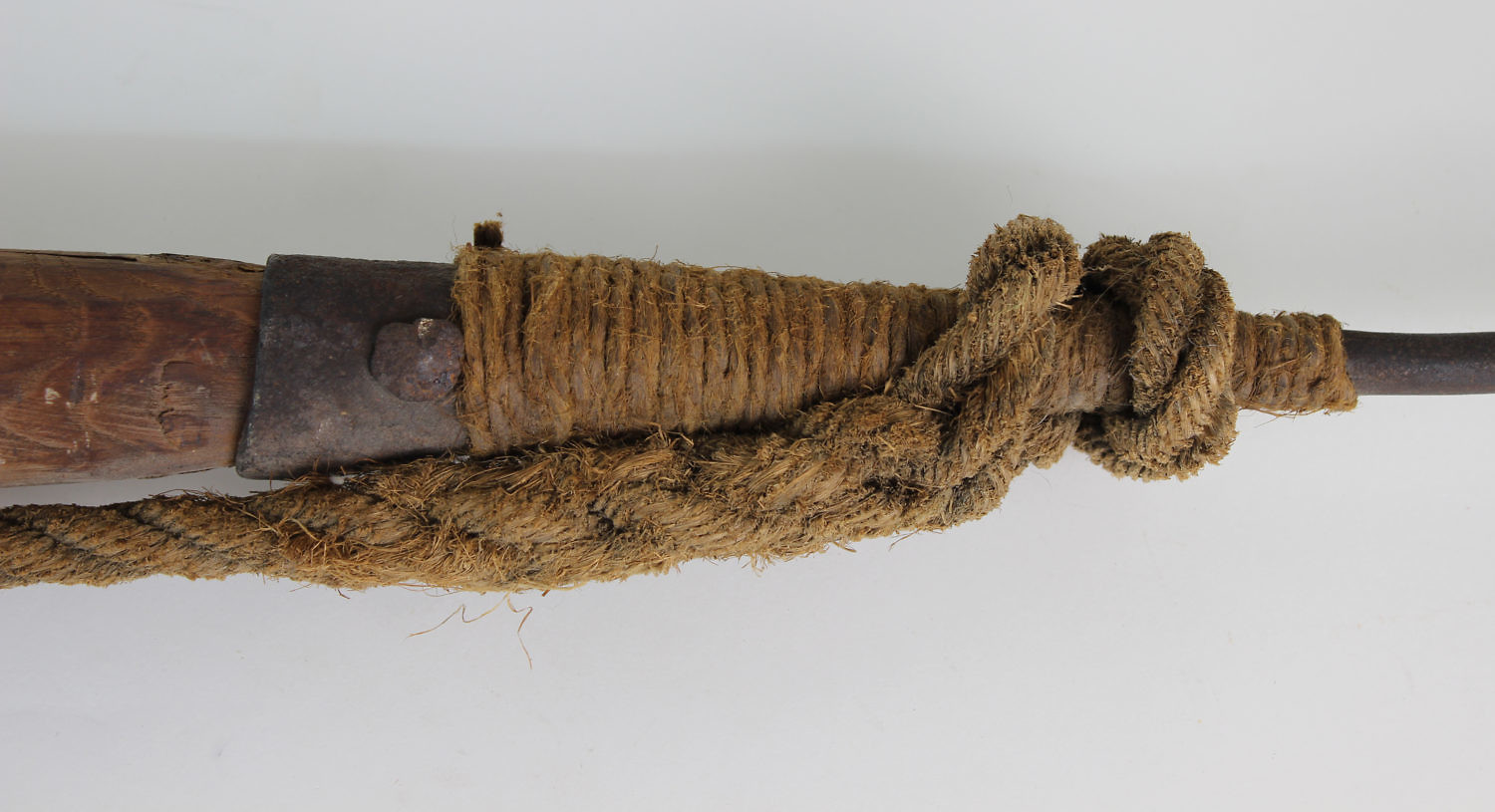 ↩
↩ -
Deep cut: in the 1850s there was a metalsmith/silverware maker in England who was “the best”. Joseph Rodgers & Sons:
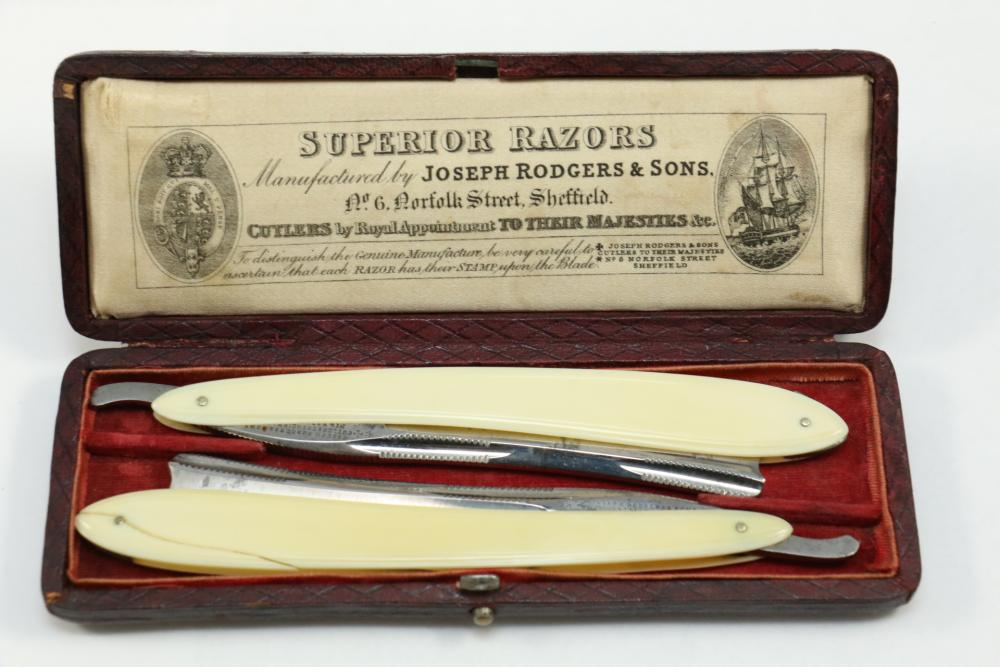 ↩
↩ -
Skylarking apparently originated AS a nautical term, specifically to describe sailors who were running around in the rigging. It doesn’t necessarily connect to the behavior of larks, although their flight can look rather playful. ↩
-
My favorite passage thus far. ↩
-
Bosky: - “Bosky” is an adjective that means “covered with or consisting of bushes, shrubs, and small trees; wooded”. It can also mean “shady”. ↩
-
Satinwood trees make hard, yellow-brown or yellow-gold wood that’s good for cabinet-making as it can be buffed up to a satin finish. ↩
-
There is a LOT going on over there on the western slope of the Andes!
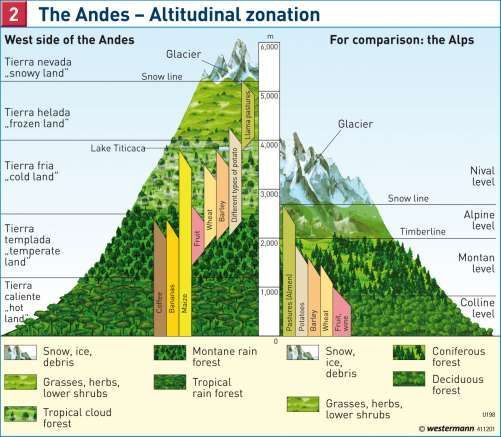 ↩
↩ -
John Ledyard (1751-1789) and Mungo Park (1771-1806) were both notable explorers. Ledyard an American, went out with Captain Cook on his final voyage (1776-1779), tried to cross Russia and Siberia and wound up getting deported by Catherine the Great, went on a exploration of the Niger River in Africa, but died in Cairo before he could begin. Mungo Park, a Scotsman, was famous for his West African explorations (he actually made it—as the first European to go up the Niger river and come back alive), mapping all the way. He died during his second expedition to navigate the Niger. ↩
-
Very pretty and in Vermont. ↩
-
The term “grapple” or “grappling” was commonly used in maritime contexts, referring to the use of a grappling iron or grapnel to secure ships together or to retrieve objects from the sea. More generally, it means seizing or holding something—a grappling hook holds on to the top edge of the building so Batman can climb up it. ↩
-
Unsurprisingly, this is now called “Wellington Pier”. instead of “Apollo Bunder”. In this picture you can see what would have been a “Green” to the left:
 ↩
↩ -
Broadway is in New York, Chestnut Street is in Philadelphia, Regent Street and Wapping are both in London, and Water Street is in Liverpool. ↩
-
Swallow’s tails are really quite something. As are the coats (which only sort of look like swallow’s tails. Mostly it was the cut-away front and the deep slit in the back combined that got them this name):

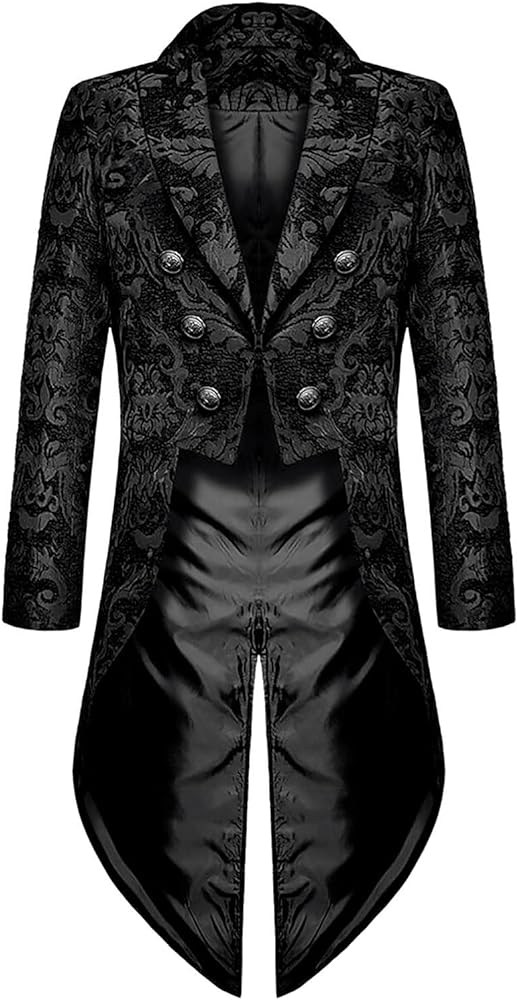 ↩
↩ -
Might be a sailing term, most likely a term for an unsophisticated country dude. (A boomkin, bumkin, or bumpkin is a short spar that may project either fore or aft on a sailing vessel, depending on its function.) ↩
-
They’re really good at keeping your hands warm, so not a smart thing to wear on the hottest summer days. ↩
-
Big ol’ buttons—big as a bell—and straps are the ones that would go under the foot to keep your trousers from riding up. ↩
-
It’s still pretty. ↩
-
A German magician who toured the US in the 1840s. ↩
-
The “Spice Islands” (so they smell good), between Indonesia and Papua New Guinea. ↩
-
Not actual bearskin, this was a heavy twilled fabric woven from wool that still had the guard hairs in, so it looked a little speckled and fuzzy. It could also be brushed to raise the fibers making it kind of shaggy - which really would be great in inclement weather weather as it would take longer for your coat to get wet. ↩
-
Desolación Island, part of the Tierra Del Fuego archipelago ↩
-
Off-shore Ground: an area of open water far off the northwest coast of South America, discovered in 1818 to be a good place for hunting sperm whales ↩
-
This connects to notes 39-41: It is perhaps no coincidence that the last of the cenotaphs observed by Ishmael in the Whaleman’s Chapel is dedicated to a captain named Ezekiel Hardy. In the contexts of burial and bereavement, the captain’s name conjures images of the Valley of Dry Bones that God reveals to Ezekiel the prophet. Despite its initially grim appearance, this biblical valley is a trope of optimism: the Lord shows Ezekiel how the power of the Holy Spirit can restore flesh and skin to the desiccated, scattered remains and breathe new life into lifeless bodies (Ezek. 37:1–10). The dry bones of the valley attest, not to the finality of loss, but to the miraculous power of the Lord to bring new life to the spiritually desolate. Melville, however, renders darker prophecies than Ezekiel. In his narrative, the prospect of resurrection is thwarted because Captain Hardy has left no bones to rejoin and return to the flesh. The bones of Melville’s Ezekiel lie not in a dry valley, but beneath the waters of the Pacific; the wherewithal for the performance of the miracle has been lost. — John T. Matteson (2006). ‘“Deadly Voids and Unbidden Infidelities”: Death, Memory and the Law in Moby-Dick’. In John Bryant, Mary K. Bercaw Edwards, and Timothy Marr, eds. “Ungraspable Phantom”: Essays on Moby-Dick, p. 124. Kent State University Press. ↩
-
The Seaman’s Bethel is real. The Pulpit was built to match the book—not the other way around. (Personally I like the design that Orson Welles preached from best).
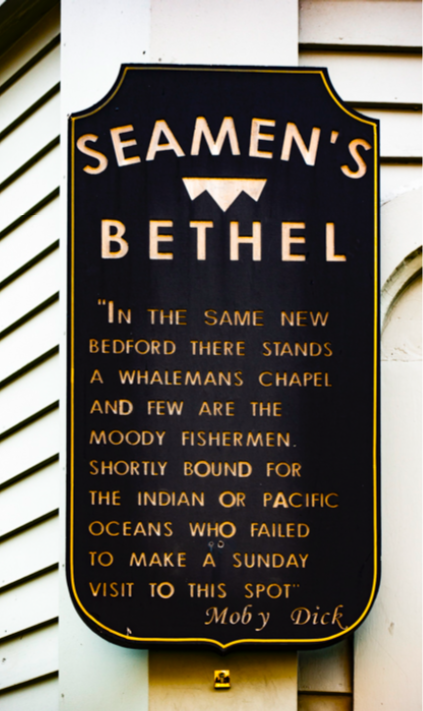 ↩
↩ -
The families who have lost someone at sea never had a body to bury, to “say goodbye” to. ↩
-
The missing bodies of the lost sailors; deadly hear meaning having to do with the dead. ↩
-
The lines are the epitaphs; Infidelity here literally meaning a loss of faith (as in, loss of faith in the resurrection). ↩
-
The Elephanta Caves are located in Western India on Elephanta Island (otherwise known as the Island of Gharapuri) near Mumbai. ↩
-
Goodwin Sands: a 10-mile-long sandbank in the English Channel, on which more than 2,000 ships are thought to have wrecked ↩
-
add before; add to the beginning ↩
-
Name him. ↩
-
People with immortal souls. ↩
-
My next fave chunk. ↩
-
A stove boat: a boat bashed inward or to pieces (for whalers, this is usually caused by a justifiably angry whale). ↩
-
Brevet: a form of military promotion, usually for valor, in which an officer’s rank is raised without a corresponding raise in pay (brief/quick promotion). ↩
-
Not the lee-side of something, but Lees: dregs or residue, such as the sediment at the bottom of a wine barrel. ↩
-
Yep, this chapter is full of goodies! ↩
-
I will always think of this set and Orson Welles and wish they were both real:
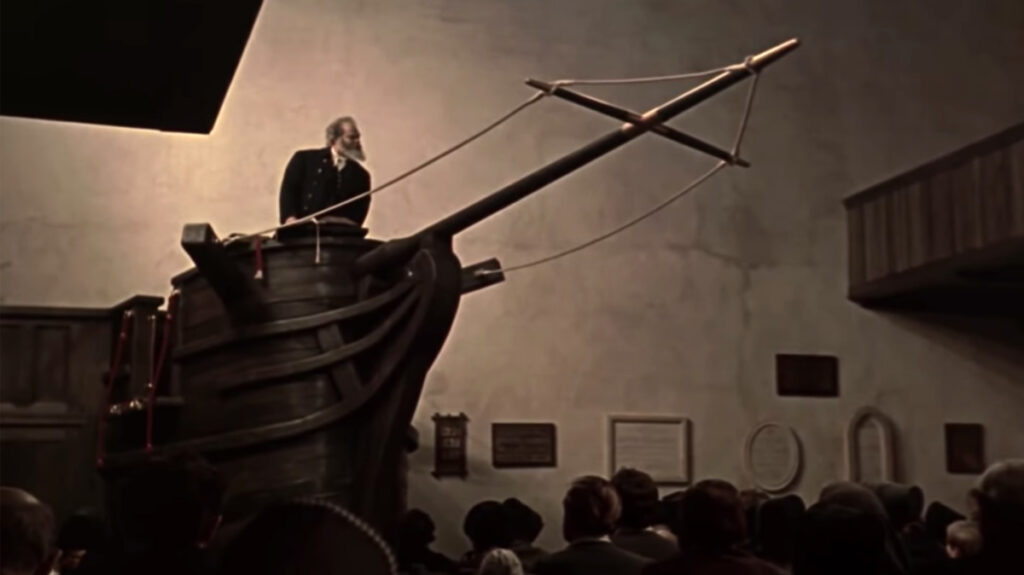 ↩
↩ -
This means he was seriously tough. When you meet the Harpooneers on the Pequod, remember that Father Mapple was one of them. ↩
-
Not made of blue Ikea bags, no these were regular ‘boater’ style hats that had been painted with Linseed oil paint or with TAR. Genius! (derived from the words “tar” and “palling,” where “palling” refers to a heavy cloth or canvas.) ↩
-
Pilot cloth: a thick blue cloth used for sailors’ coats and jackets ↩
-
Man-ropes: ropes alongside a ladder that serve as handrails ↩
-
Main-top: the main-top mast, which is the second, upper section of a ship’s main mast ↩
-
Rounds: rungs ↩
-
Fortress, because Old Quebec City in the province of Quebec, Canada, is a fortified, walled city ↩
-
Fortress on the Rhine:
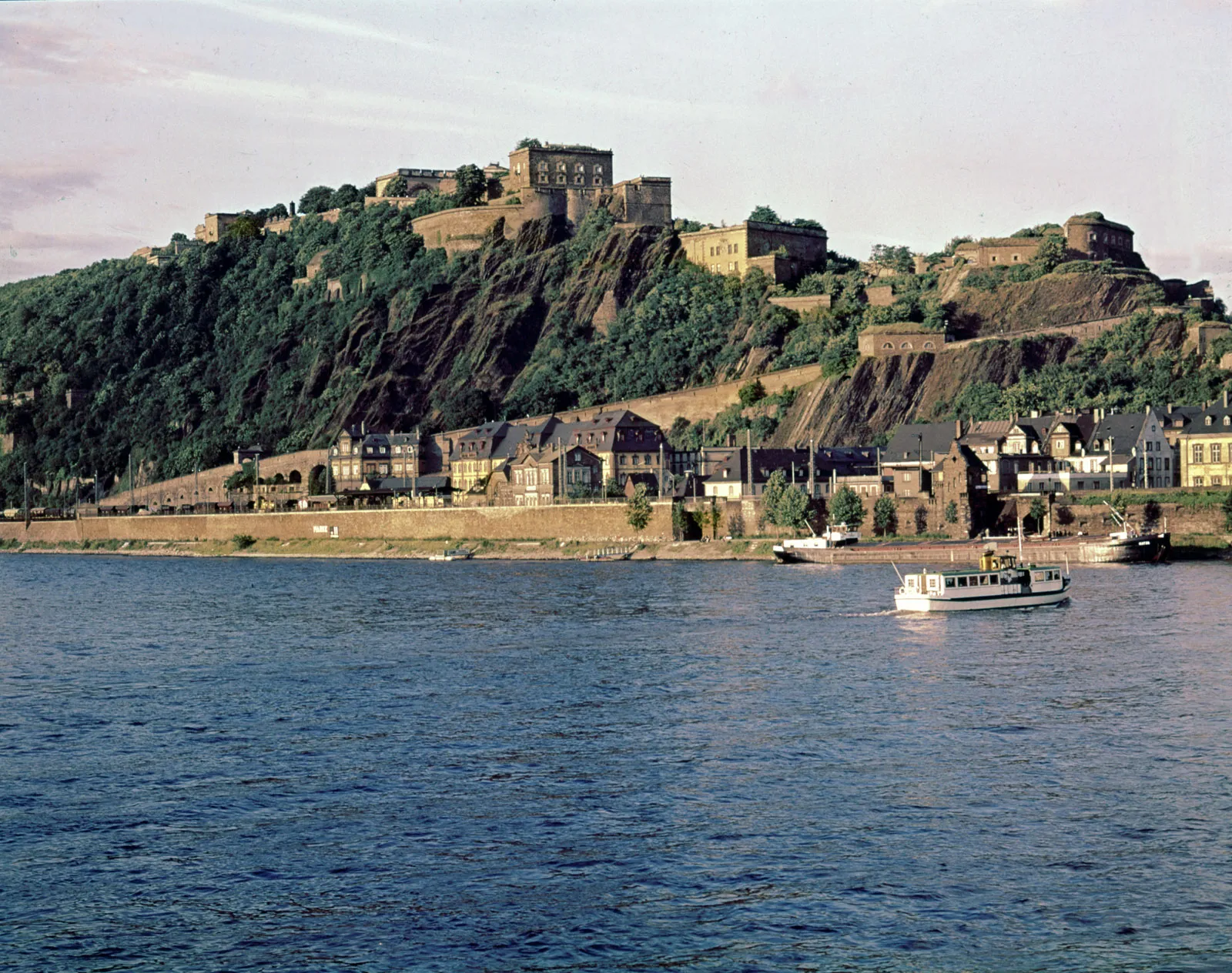 ↩
↩ -
The word “cenotaph” comes from the Greek “kenotaphion,” which literally means “empty tomb”. ↩
-
Lee coast: a shore downwind of the ship ↩
-
“flying scud” would most likely refer to a fast-sailing ship, particularly a clipper ship known for its speed. ↩
-
The Victory’s plank where Nelson fell: British Vice-Admiral Horatio Nelson (1758-1805), a hero of the Napoleonic Wars, was killed on the deck of his ship, Victory, during the Battle of Trafalgar. ↩
-
Fiddle-headed beak: a decorative wooden scroll placed at the very front of a ship, in place of a figurehead ↩
-
Descried: caught sight of, noticed ↩